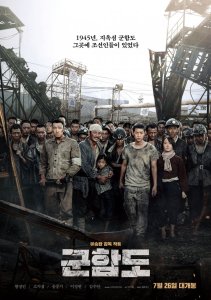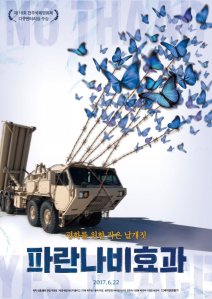 While the films released throughout any particular year are indicative of a country’s identity, for Korean cinema in 2017 the exploration of political and social issues were especially revealing of the cultural shift that has arisen in the wake of Park Geun-hye’s presidency.
While the films released throughout any particular year are indicative of a country’s identity, for Korean cinema in 2017 the exploration of political and social issues were especially revealing of the cultural shift that has arisen in the wake of Park Geun-hye’s presidency.
The political upheaval was echoed through several historical films/documentaries focused on past atrocities, democratization, and the relationship with North Korea. This in turn has inspired considerable – and often heated – debate between the right and left, as well as resulting in plenty of tears at the multiplex.
In truth, 2017 was not an especially strong year for K-cinema (and when compared with 2016 this seems even more the case), yet there were a number of releases that were bold, provocative and pulled at the heart strings. The titles contained in this list are from films that were seen for the first time either through nationwide release or at film festivals throughout the year.
No. 10 – The King <더 킹>

Released way back on January 18th, The King stylishly depicts the dark underbelly of corrupt politicians and law-makers, and their collusion with gangsters to achieve power. Director Han Jae-rim (The Face Reader, The Show Must Go On) conducts all the power-grabs, betrayals and violence with a playful relish that is consistently entertaining, crafting likeable anti-heroes in the mould of gangster epics such as Goodfellas in his peak-behind-the-curtains tale of corruption.
No. 9 – The Battleship Island: Director’s Cut <군함도: 감독판>
 The Battleship Island was intended as the big blockbuster of 2017, yet as soon as the theatrical cut was released it proved particularly divisive. The Director’s Cut, which appeared at the Busan Film Festival in October, improves things. It’s a big entertaining blockbuster high on production values and spectacle, with director Ryoo Seung-wan (Veteran, The Berlin File) bombastically helming the tragic story with confidence. Battleship Island: Director’s Cut is also notable for depicting some Koreans as pro-Japanese during the war, something that would have been unthinkable until recently.
The Battleship Island was intended as the big blockbuster of 2017, yet as soon as the theatrical cut was released it proved particularly divisive. The Director’s Cut, which appeared at the Busan Film Festival in October, improves things. It’s a big entertaining blockbuster high on production values and spectacle, with director Ryoo Seung-wan (Veteran, The Berlin File) bombastically helming the tragic story with confidence. Battleship Island: Director’s Cut is also notable for depicting some Koreans as pro-Japanese during the war, something that would have been unthinkable until recently.
No. 8 – Midnight Runners <청년경찰>

Seemingly coming out of nowhere, Midnight Runners was easily one of the most fun K-films of the year. Frequently laugh-out-loud hilarious, director Kim Joo-hwan’s story of two socially inept police cadets who stumble onto organised crime is far more fun than it has any right to be. The gags come thick and fast while the kinetic action set pieces are greatly entertaining, yet the film also has real heart as the bonds of friendship and the injustices suffered by runaways are depicted.
No. 7 – The Outlaws <범죄도시>
 All hail Ma Dong-seok. Another hugely entertaining action-comedy that came out of left field, action-comedy The Outlaws sees the incredibly charismatic Mr. Ma as a tough cop battling against Chinese gangsters. Director Kang Yoon-sung’s impressive debut was a surprise hit upon release thanks to strong word of mouth, earning just over $52.7 million at the box office (KoBiz). Featuring great humour, adrenaline-pumping action and high stakes, The Outlaws cements Ma Dong-seok’s credentials not only as an action star but as leading man material.
All hail Ma Dong-seok. Another hugely entertaining action-comedy that came out of left field, action-comedy The Outlaws sees the incredibly charismatic Mr. Ma as a tough cop battling against Chinese gangsters. Director Kang Yoon-sung’s impressive debut was a surprise hit upon release thanks to strong word of mouth, earning just over $52.7 million at the box office (KoBiz). Featuring great humour, adrenaline-pumping action and high stakes, The Outlaws cements Ma Dong-seok’s credentials not only as an action star but as leading man material.
No. 6 – Blue Butterfly Effect <파란나비효과>
 Winner of the Documentary Award at Jeonju Film Festival, director Park Moon-chil’s Blue Butterfly Effect follows the escalation of tension as the THADD missile system is forcibly positioned within a small farming community. The film brilliantly captures not only the political strife surrounding the issue but also the manner in which the protest movement is formed from grass roots through to a force to be reckoned with. Criminally under appreciated upon release, Blue Butterfly Effect offers great insight into the nature of Korean political unrest.
Winner of the Documentary Award at Jeonju Film Festival, director Park Moon-chil’s Blue Butterfly Effect follows the escalation of tension as the THADD missile system is forcibly positioned within a small farming community. The film brilliantly captures not only the political strife surrounding the issue but also the manner in which the protest movement is formed from grass roots through to a force to be reckoned with. Criminally under appreciated upon release, Blue Butterfly Effect offers great insight into the nature of Korean political unrest.
Top 10 Films of 2017 – No. 5~1
___________________________________________________________________
Top 10 Korean Films of 2014 – Most Memorable Moments of 2014
Top 10 Korean Films of 2013 – Most Memorable Moments of 2013



